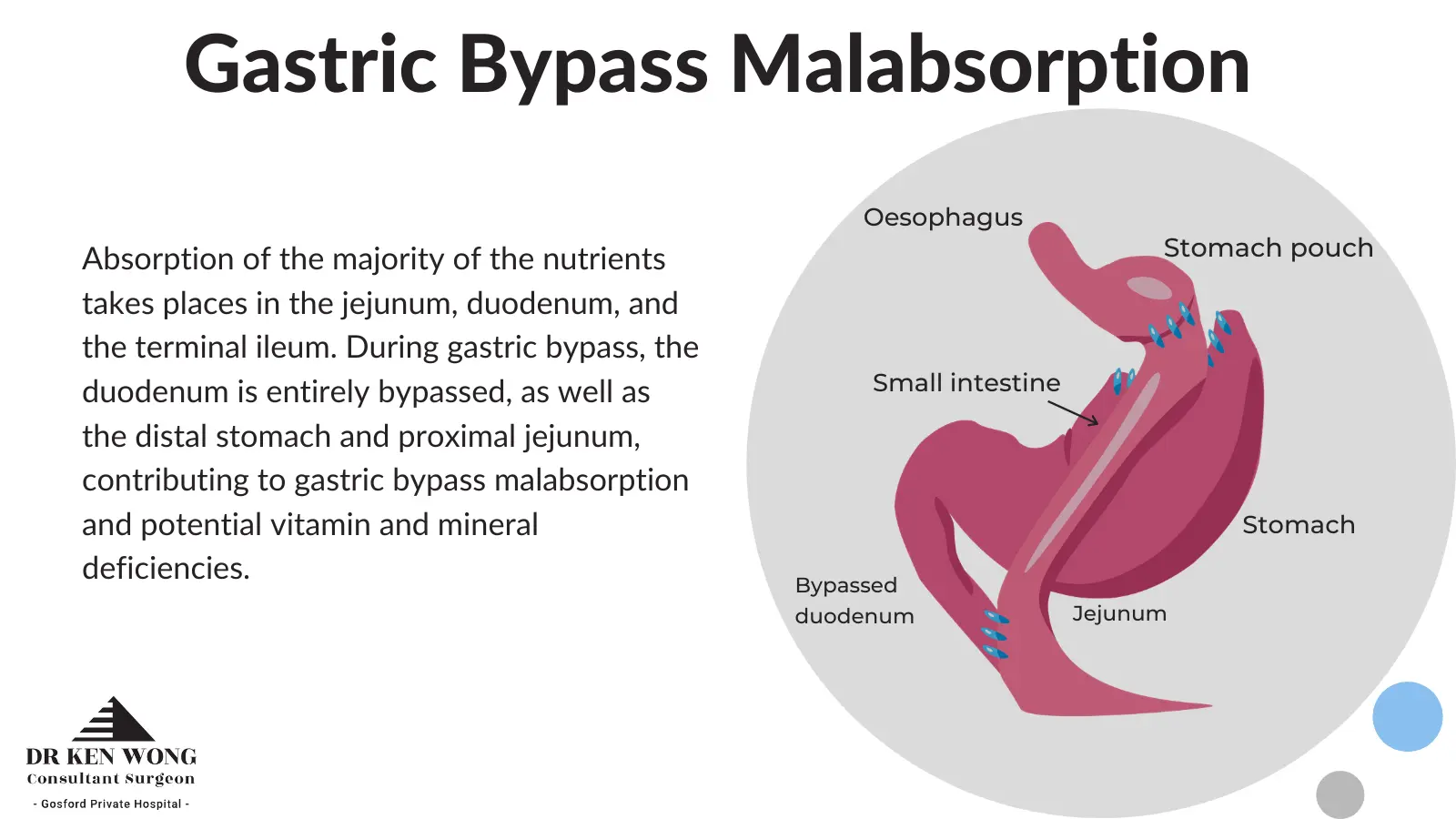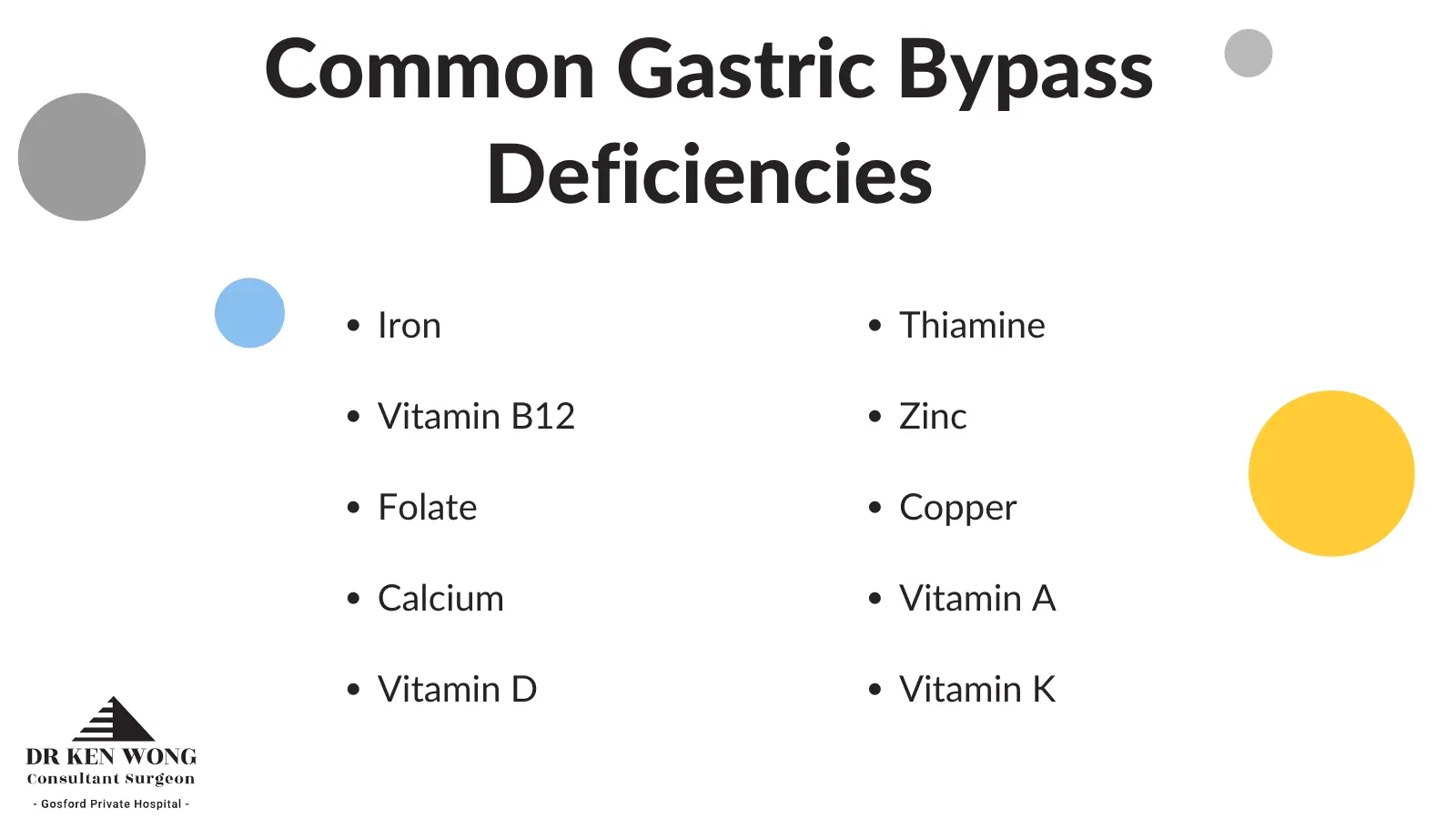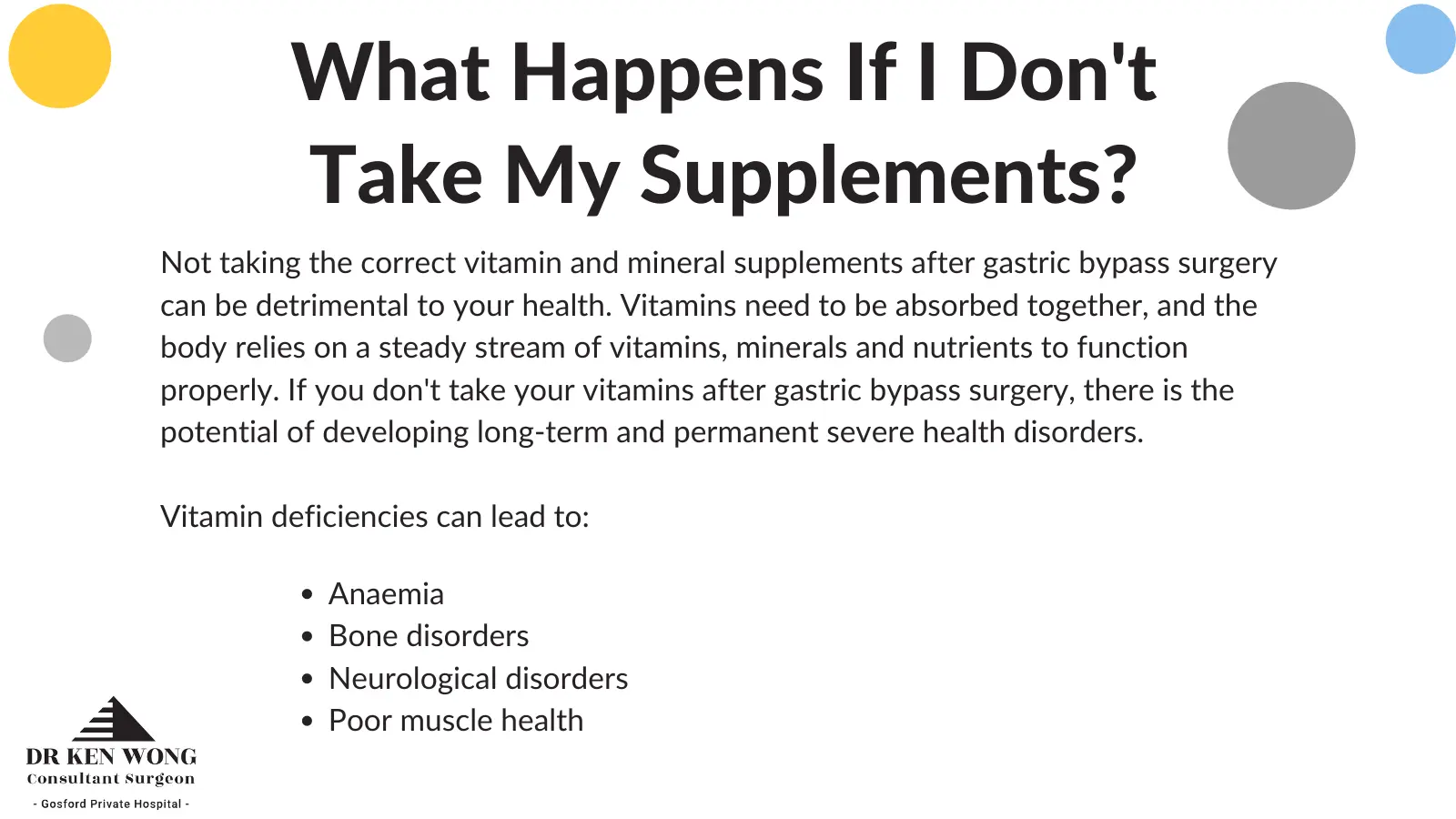Vitamins After Gastric Bypass - Your Guide to Gastric Bypass Malabsorption
Gastric bypass surgery is a minimally invasive bariatric procedure that permanently changes the digestive system in an effort to support weight loss. Given the nature of the procedure, patients who have undergone gastric bypass surgery are at risk of gastric bypass malabsorption.
Bariatric surgery requires a long-life commitment to a healthy lifestyle to garner successful and healthy weight loss results. It is common knowledge that following bariatric surgery, patients will undergo strict changes to diet and exercise. So, why do patients also need to consider the intake and absorption of vitamins after gastric bypass surgery?
Why Do I Need Vitamins After Gastric Bypass Surgery?
Gastric bypass surgery is an incredibly effective weight loss procedure regularly performed in all states of Australia. A form of bariatric surgery, gastric bypass operations are used to treat morbid obesity. For those undergoing gastric bypass surgery, lifelong nutritional support is a critical factor in successfully losing weight and keeping it off.
The nature of gastric bypass surgery means that a portion of the small intestine is bypassed, which forces the body to undergo neuroendocrine changes and absorb fewer nutrients from food consumed. While post-operative dietary requirements can often provide sufficient vitamins and minerals, most gastric bypass patients will need to supplement and take additional vitamins after bariatric surgery because of gastric bypass malabsorption.
What Is Roux en Y Gastric Bypass Malabsorption?
Gastric bypass malabsorption, or Roux en Y gastric bypass malabsorption, refers to the body’s inability to absorb vitamins and minerals from the food being consumed. While this is an important process of supporting weight loss, not absorbing the vitamins and minerals after gastric bypass surgery can also be incredibly dangerous and lead to severe micronutrient deficiencies.

During gastric bypass surgery, surgical staples are used to create a small pouch in the top part of the stomach. The pouch is then attached to the lower part of the small intestine, creating a channel for food to bypass most of the stomach and the first section of the small intestine. There are two main reasons this procedure supports weight loss:
- The small stomach pouch can only hold so much food before feeling full
- Less food is absorbed into the body
While this means that fewer calories are absorbed into the body, it also means that the section of the intestine that normally absorbs important vitamins and minerals is out of action. Absorption of the majority of the nutrients takes places in the jejunum, with a few exceptions: iron is absorbed in the duodenum, and vitamin B12 and bile salts are absorbed in the terminal ileum. During gastric bypass, the duodenum is entirely bypassed, as well as the distal stomach and proximal jejunum, contributing to potential vitamin and mineral deficiencies.
The most common deficiencies caused by Roux en Y gastric bypass malabsorption are that of iron, vitamin B12, folate, calcium and vitamin D. Other less common nutrient deficiencies that can occur after gastric bypass surgery include thiamine, zinc, copper and vitamins A and K.
Symptoms of Vitamin Deficiency After Gastric Bypass
Nutritional deficiencies are often unrecognised in patients who undergo gastric bypass surgery. The symptoms of vitamin and other nutrient deficiencies after gastric bypass surgery can vary, depending on which deficiency the surgical weight loss patient is suffering from and how severely. The most common symptoms of vitamin deficiency after gastric bypass or laparoscopic adjustable gastric banding include:
- Light-headedness
- Fatigue
- Dizziness
- Unsteady on feet
- Blurred vision
- Weakness
- Mouth ulcers
- Hair loss
However, symptoms experienced by those with vitamin deficiencies can vary significantly depending on which vitamins and minerals they are deficient in. These are just some of the early/acute symptoms experienced by patients after bariatric procedures; long-term symptoms and deficiency problems can be chronic and severe.

How Common Is the Problem of Vitamin Deficiency After Gastric Bypass?
What many don’t realise, is that most bariatric patients, if not all, who undergo gastric bypass surgery will need to take vitamin supplements for the rest of their lives. Vitamin deficiency after gastric bypass is something experienced by almost 40% of all gastric bypass patients. Whether it be due to patients not adhering to the strict dietary and supplementation guidelines after they have undergone bariatric surgery, or physicians not diligently checking their patient’s vitamin levels, the problem of vitamin deficiency after gastric bypass surgery is surprisingly very common.
What Vitamins and Minerals Do I Need After Gastric Bypass?
Gastric bypass is a very safe and effective weight loss procedure. However, dietary supplementation needs to begin immediately after the surgery, while the bariatric surgery patient is still in the hospital. Vitamin absorption after gastric bypass surgery is heavily reliant on the patient complying with prescribed supplements, and physicians diligently monitoring patients for micronutrient deficiencies.
Regardless of which bariatric surgery you undergo, the fact of the matter is, you will be consuming less food after your bariatric surgery. This means that it is difficult to meet your nutrient needs each day, putting you at risk of nutritional deficiencies.
Still wondering “What Vitamins and Minerals Do I Need After Gastric Bypass?” the vitamins and supplements that you need to take after gastric bypass will depend on your dietician, physician and surgeon’s advice. Generally speaking, doctors recommend that gastric bypass surgery patients take a complete multivitamin, calcium with vitamin D, iron and vitamin C, vitamin D and vitamin B12. However, others may be recommended depending on your medical history or health concerns.
What Happens If I Don’t Take Vitamins After Gastric Bypass?
Not taking vitamins after gastric bypass surgery and skipping vital supplementation can be incredibly dangerous. Nutrients work together, not individually. The body relies on a steady supply of these essential nutrients together; not independently. That’s why after gastric bypass surgery, you can’t simply eat enough food and potentially absorb nutrients in the same way before bariatric surgery; you need to supplement your daily healthy food intake with vitamins and mineral supplements.
So, what happens if you don’t take supplements and vitamins after gastric bypass surgery? There are a number of specific conditions that can be driven by inadequate mineral and vitamin absorption after gastric bypass. These include:
Anaemia
Anaemia is the term for a group of different blood disorders and will occur from a lack of different nutrients. Anaemia can be caused by several factors including inadequate intake or absorption of iron, vitamin B12, folate, copper and zinc. Anaemia can make you feel very weak, tired or cause pain from nerve damage in the hands and feet.
Bone Disorders
In order to maintain a strong bone structure, the body requires a certain amount of vitamin D, calcium, vitamin K, magnesium, essential fatty acids, b-vitamins and other important vitamins and minerals. Without the right nutrition, vitamins and minerals, bones can become weak, porous, or soft, which puts patients at risk for fracture or damage.

Neurological Disorders
An early experienced symptom of vitamin deficiency after gastric bypass surgery is usually neurological related to inadequate absorption of vitamin B1 (thiamine). Thiamine is not stored in the body for very long, so we need a constant supply of it. Without adequate intake, a serious nutrition complication can occur where a patient will become confused, won’t be able to walk properly or in severe cases, become paralysed. Neurological disorders caught early on can often be reversed. However, if not detected and appropriately treated, thiamine vitamin deficiencies can cause long term neurological disorders.
Muscle Health
Protein is a crucial element of ensuring muscle health after surgery. Failing to consume adequate amounts of protein after bariatric surgery can lead to poor muscle health, leaving patients at risk of not being able to maintain appropriate amounts of muscle. This can result in weakness, or unfavourable body composition wherein there is more fat mass than is considered healthy.
The Importance of Vitamins After Gastric Bypass Surgery
If you’ve undergone gastric bypass surgery, it was likely a decision to improve your health and wellbeing. Following your procedure, your body needs more vitamins and minerals than before bariatric surgery because of a change in anatomy, decreased intake and potential malabsorption of nutrients. If you want to continue your journey to living a healthy, balanced diet, you need to take your vitamin and mineral intake and absorption seriously.
Your weight loss clinic will have prescribed you a strict supplementation of vitamins, minerals and important nutrients to take after your bariatric surgery. What’s more, your physicians and dieticians will need to carefully monitor you after your gastric bypass surgery to ensure you are meeting your nutrient needs. Here at Central Coast Surgery, we work one-on-one with every patient to ensure they understand the importance of vitamin intake and Roux en Y gastric bypass malabsorption. We conduct thorough and comprehensive nutritional testing to make sure that each patient can adhere to a strict vitamin regimen safely and confidently. Committed to helping Australian patients begin their successful weight loss journeys with obesity surgery, we’ll be there every step of the way before, during and after your gastric bypass surgery. Call (02) 4323 7000 today to talk to someone about your gastric bypass consultation.
Ready for a transformation? Get all the information on gastric sleeve surgery newcastle from our experts.
